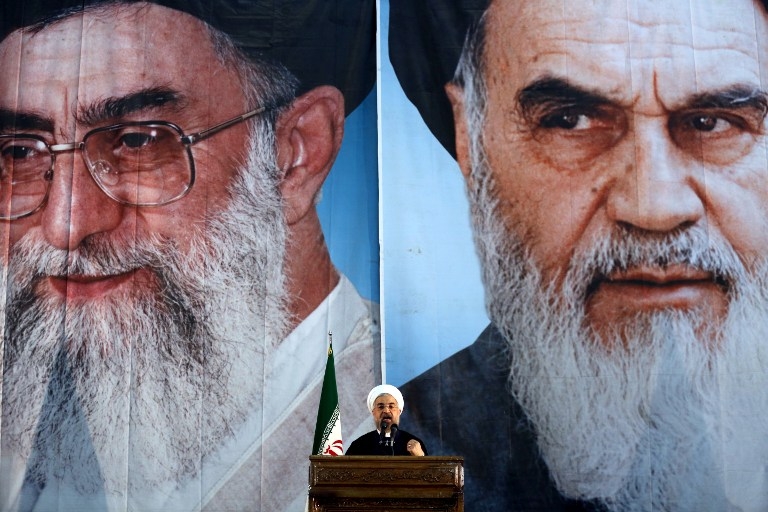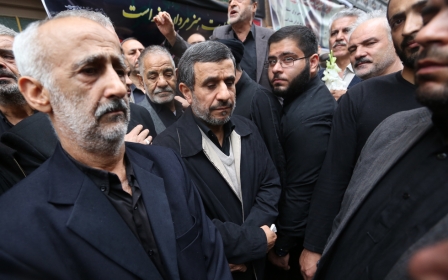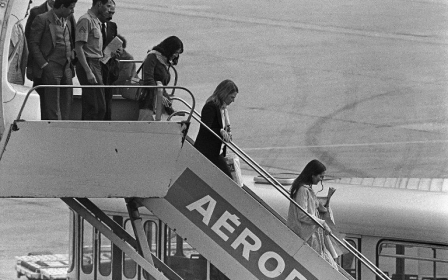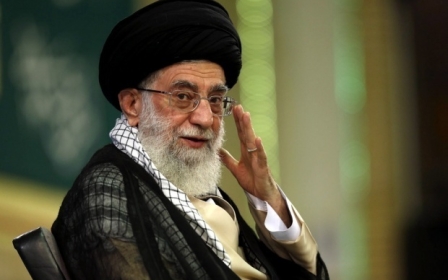US hawks give Iran hardliners ammunition against Rouhani

Iranian President Hassan Rouhani already faces a challenging task appeasing his political rivals who are apparently wounded by the conclusion of the long-sought nuclear deal with the six world powers - the five UN Security Council permanent members and Germany.
It is an accord that the Iranian people are overwhelming supportive of, as it ends the suffering they have endured for decades as they bore the brunt of the West’s economic sanctions. Hardliners, however, still cannot conceal their anger at it, simply because the deal was signed by somebody other than Mahmoud Ahmadinejad, but also because it was signed with their favorite bogeyman, the United States.
President Rouhani needs to constantly sing the deal's praises (the Joint Comprehensive Plan of Action) to sustain public optimism about its forthcoming blessings. Day and night, Rouhani is attacked by the conservatives in the majlis (Iran’s parliament). Nor does state TV exactly shy away from calling his negotiators, headed by Foreign Minister Javad Zarif, “traitors".
At the same time, the Republicans of the US Congress making President Rouhani’s life even harder by putting forward bills that simply serve to empower the radicals, chip away at the chances for a viable Iran-US rapprochement and undermine the legacy of the nuclear deal.
Just recently, the two chambers of the US Congress voted for the inclusion of the Visa Waiver Program Improvement and Terrorist Prevention Act of 2015 (HR 158) in the Omnibus Appropriations Bill, which President Barack Obama has signed into law.
'Rogue states'
According to this new provision, the citizens of 38 countries, which are the US partners in a Visa Waiver Program (VWP) and can normally travel to the United States without a visa, would need to apply for one if they have visited Iran since March 2011, or travel to the country in the future. Under this piece of legislation, Iran is ranked alongside Iraq, Syria and Sudan as the four “rogue states” which the citizens of that privileged 38 countries should turn away from; otherwise, they have to go through the lengthy, time-consuming process of applying for a US visa once they decide to travel to America.
The act was apparently propped up as a response to the Paris attacks and the 2 December San Bernardino shooting spree. The argument behind the introduction of this act was that it would deter terrorist threats to America and help identify those people who might have joined radical groups in either of these countries upon visiting them. However, Iranians are communally mesmerised about the decision made by the US government and cannot fully comprehend the links between Islamic State (IS) terrorists and themselves.
Looking into the list of foreign fighters who have joined IS since the eruption of civil war in Syria five years ago, one cannot find a single Iranian combatant who has pledged allegiance to Daesh (an Arabic acronym for IS), while there are at least 5,000 Tunisian, 2,200 Saudi, 1,550 French, 1,200 Moroccan and 1,400 Turkish citizens in the ranks of this terror sect.
Even though reluctantly, Iran has been acknowledged to be one of the few nations in the region that fights IS genuinely and determinedly. Members of Congress who were unable to ruin the nuclear deal between Iran and the six world powers are dead set on taking revenge on Iranians. It is a display of muscle-flexing and of bullying prowess rather than a realistic, down-to-earth solution to address the threat terrorism posed to US borders.
Even the San Bernardino shooting perpetrators were of Pakistani descent, and it’s unclear what motivated the American lawmakers to include Iran in the list of countries that should face this punitive measure; a measure that means Iran should brace for a blackout in its emergent tourism industry and reviving trade ties with the international community.
Apparently, the citizens of these 38 countries, including some of Iran’s major trade partners in the European Union and East Asia, would prefer to preserve their prerogative of travelling to the United States unimpeded instead of taking on the hazardous, burdensome venture of travelling to Iran in these tense times.
Entirely counterproductive
The US lawmakers’ decision was entirely counterproductive. Iran’s Foreign Minister Javad Zarif, just named the Global Risk Insights’ 2015 Person of the Year in Political Risk for embracing the risky initiative of talking to the United States directly after 37 years of diplomatic rupture between Tehran and Washington, reticently admitted that it was a violation of the Joint Comprehensive Plan of Action, and especially its article 29, which clearly stipulates that the United States, under the terms of the deal, should refrain from any action that “adversely affect the normalisation of trade and economic relations with Iran".
The Congressional action will have no effect on terrorism, but it could yet have an effect on Rouhani. The implementation day of the nuclear deal has not arrived yet, and the hardliners in Tehran are awaiting the emergence of the minutest apertures for nipping the agreement in the bud, even though the conservative parliament endorsed it, and the Guardian Council also authorised it.
Now, there are hard-line commentators who openly brag about the urgency for the Rouhani administration to declare the nuclear deal null and void because it was violated by the United States. They don’t shy away from pitting President Rouhani against the Supreme Leader, Ayatollah Ali Khamenei, by saying that Rouhani’s refusal to nullify the nuclear deal would be an infringement upon the leader’s conditional endorsement of the agreement; an accusation that could cost Rouhani dearly.
These people who frequently appear on state TV and have the loudest megaphones have created a deafening hue and cry that the new slap by Congress across Iran’s face is an outcome of President Rouhani’s non-confrontational, lenient foreign policy and his interaction with the United States. They are apparently lamenting the new anti-Iranian measure, but to be honest they scarcely care an iota about the negative impacts this act would have on Iran’s economy, tourism and foreign trade.
Retrospectively, they turned a blind eye on seven UN Security Council resolutions and ceaseless torrent of unilateral sanctions imposed on Iran by the United States, Canada, Australia and even the country’s traditional allies such as South Korea, Japan and India when Mahmoud Ahmadinejad was in power. These sanctions pushed the inflation rate in Iran to 40% and dragged the country’s GDP down by 20%.
Insincere criticism
Hardliners did their utmost to whitewash the devastating impact of the sanctions on the nation’s economy and the livelihoods of the voiceless people because it was their hero, Mr Ahmadinejad, who had brought them in. Some of them would call the sanctions “a disguised blessing of the Almighty God,” and some of them would dare to invite more nations to place sanctions on Iran, because they said it would encourage national self-sufficiency.
And now they have become concerned about the economic opportunities Iran will be stripped of under the HR 158 act, which they claim merits a proportionate action: the complete annulment of the nuclear deal.
I agree with the hardliners that the new Congress legislation is going to cause irretrievable damage to Iran’s foreign trade and tourism industry, should the Obama administration fail to take proper action to address Iran’s legitimate concerns.
However, I also believe it is simply serving to complicate President Rouhani’s job by forcing him to spend more time quashing the insincere, ruthless criticism of those here who will benefit from the premature death of the nuclear deal and the perennial prolongation of hostilities between Iran and the United States, and go through fire and water to take the legacy of rapprochement and constructive engagement away from Iran’s moderate president.
-Kourosh Ziabari is an award-winning Iranian journalist and media correspondent. He is staff writer with Iran Review and a reporter with the California-based Fair Observer. He has also contributed to Huffington Post, Your Middle East, International Policy Digest, Gateway House and Tehran Times.
The views expressed in this article belong to the author and do not necessarily reflect the editorial policy of Middle East Eye.
Photo: Iranian President Hassan Rouhani delivers a speech under portraits of Iran's supreme leader, Ayatollah Ali Khamenei (L) and Iran's founder of the Islamic Republic, Ayatollah Ruhollah Khomeini (R), on the eve of the 25th anniversary of the Islamic revolutionary leader Ayatollah Ruhollah Khomeini's death, at his mausoleum in a suburb of Tehran on 3 June, 2014 (AFP).
Middle East Eye propose une couverture et une analyse indépendantes et incomparables du Moyen-Orient, de l’Afrique du Nord et d’autres régions du monde. Pour en savoir plus sur la reprise de ce contenu et les frais qui s’appliquent, veuillez remplir ce formulaire [en anglais]. Pour en savoir plus sur MEE, cliquez ici [en anglais].





